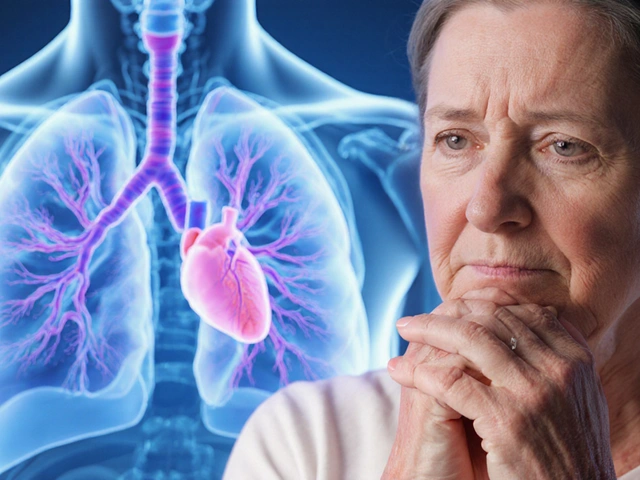Hormonal Vaginal Irritation Symptom Checker
Check Your Symptoms
Select all symptoms you're experiencing. This tool helps identify possible hormonal causes based on your symptoms.
Your Results
Select your symptoms and click "Check Results" to see personalized information.
Recommended Actions:
- Stay hydrated to support tissue moisture
- Use fragrance-free, water-based lubricant during intercourse
- Consider vaginal moisturizers with hyaluronic acid
When the balance of hormones shifts, many women notice itching, burning, or unusual discharge. Those symptoms are often called vaginal irritation - a condition that can be uncomfortable and sometimes confusing.
What exactly are hormonal changes?
Hormonal changes refer to the natural rise and fall of estrogen, progesterone, and other sex hormones in the body. Hormonal changes are fluctuations in the levels of estrogen, progesterone, and related hormones that occur throughout a woman’s life. They happen during puberty, the menstrual cycle, pregnancy, and later life stages like perimenopause and menopause.
Why hormones matter for vaginal health
The lining of the vagina is a living tissue that responds to hormone signals. Estrogen keeps the tissue thin, elastic, and well‑lubricated. Progesterone helps regulate the mucus that protects against infection. When these hormones dip or spike, the vaginal ecosystem can become unbalanced, leading to irritation.
Common hormonal phases that trigger irritation
- Menstrual cycle: In the luteal phase (after ovulation), progesterone peaks while estrogen drops. Some women experience a tighter, drier vagina and feel itching.
- Premenstrual syndrome (PMS): Hormone swings can heighten sensitivity, making normal moisture feel uncomfortable.
- Perimenopause: Estrogen declines gradually over several years, often causing dryness, burning, and occasional soreness.
- Menopause: A sharp fall in estrogen leads to thinning of the vaginal walls, reduced lubrication, and higher susceptibility to irritation.
- Birth control pills: Synthetic hormones can either stabilize or upset the natural balance, depending on the formulation.
How low estrogen creates irritation
Estrogen supports the production of glycogen in vaginal epithelial cells. Glycogen feeds good bacteria, especially Lactobacillus, which keep the pH acidic (around 3.8‑4.5). When estrogen drops:
- Glycogen levels fall, so fewer Lactobacilli thrive.
- The vaginal pH rises, creating a friendlier environment for yeast and harmful bacteria.
- The lining becomes thin and less flexible, making it more prone to micro‑tears and inflammation.
These changes are why many women describe a “tight” feeling, burning during intercourse, or a constant need to use moisturizers.

When high estrogen can be a problem
Too much estrogen isn’t safe either. Certain hormonal therapies or high‑dose birth control can cause excess moisture, leading to a damp environment where Candida albicans (yeast) grows quickly. The result is a classic yeast infection-itchy, white discharge that mimics irritation.
Other factors that interact with hormones
Hormonal shifts rarely act alone. Lifestyle, medications, and underlying infections can amplify the effect.
- Antibiotics: Kill off Lactobacilli, raising pH and worsening irritation.
- Stress: Triggers cortisol release, which can suppress estrogen production.
- Diet: High sugar intake feeds yeast; low phyto‑estrogen foods can limit natural estrogen sources.
Practical ways to soothe hormone‑related irritation
Here’s a quick checklist you can start using today:
- Stay hydrated - water helps keep tissues moist from the inside out.
- Use a water‑based, fragrance‑free lubricant during sex to reduce friction.
- Consider a vaginal moisturizer with hyaluronic acid for daily use.
- Eat foods rich in phyto‑estrogen (flaxseed, soy) if you’re in perimenopause.
- Talk to a healthcare provider about low‑dose estrogen therapy or vaginal estrogen rings for menopause‑related dryness.
- If you suspect a yeast infection, look for thick white discharge and use an over‑the‑counter antifungal after confirming with a doctor.

Comparison of low vs. high estrogen effects on the vagina
| Aspect | Low Estrogen (e.g., menopause) | High Estrogen (e.g., hormone therapy) |
|---|---|---|
| Vaginal Tissue Thickness | Thin, fragile | Thick, sometimes overly moist |
| Lubrication | Decreased, leading to dryness | Often increased, may feel overly wet |
| pH Level | Rises above 4.5 (more alkaline) | Usually stays acidic, but can become neutra l if over‑produced |
| Common Irritation Symptoms | Burning, itching, painful intercourse | Itching, thick discharge, yeast overgrowth |
| Typical Management | Moisturizers, low‑dose estrogen, lubricants | Adjust hormone dose, antifungal treatment if needed |
When to see a professional
If irritation lasts more than a week, is accompanied by fever, foul odor, or intense pain, it’s time to book an appointment. A clinician can run a simple pH test, microscopy, or culture to rule out infections like bacterial vaginosis (BV) or candidiasis. Early treatment prevents complications such as urinary tract infections or chronic discomfort.
Key takeaways
- Hormonal fluctuations are a major driver of vaginal irritation.
- Low estrogen dries and thins tissue; high estrogen can cause excess moisture and yeast growth.
- Lifestyle, stress, antibiotics, and diet can magnify the effect.
- Simple remedies-hydration, moisturizers, and balanced diet-help, but medical advice is essential for persistent or severe cases.
Can birth control pills cause vaginal irritation?
Yes. Some formulations raise estrogen levels enough to create a damp environment that encourages yeast growth. If you notice persistent itching after starting a new pill, talk to your doctor about switching to a lower‑dose option.
Is vaginal dryness the same as irritation?
Dryness is a common cause of irritation, but irritation can also stem from infections, allergic products, or hormonal spikes. Identifying the root cause guides the right treatment.
How long does menopause‑related irritation last?
It varies. Some women feel relief after a few months of low‑dose estrogen or moisturizers; others continue to need support for years. Consistent care usually eases symptoms.
Can diet really affect vaginal health?
Absolutely. High sugar feeds yeast, while foods rich in omega‑3s and phyto‑estrogens help maintain a healthy balance of bacteria and keep tissue supple.
When should I consider estrogen therapy?
If you’re post‑menopausal and experience persistent dryness or irritation that over‑the‑counter products can’t fix, discuss low‑dose vaginal estrogen options with your provider. It’s a safe, targeted way to restore moisture.








9 Comments
Jake Hayes October 21, 2025
The hormonal mechanisms you described are correct, but you overlook the role of cortisol in modulating estrogen receptors during stress.
parbat parbatzapada October 21, 2025
Yo, i read the post and i feel like the gov is hidin' the real cause-maybe those pills are a surveillance tool. Also, u know how my aunt kept saying she got "the itch" after a weird midnight ritual? Anyway, it's probably just stress, but who knows.
John Price October 21, 2025
Interesting overview, especially the part about diet.
Eryn Wells October 21, 2025
Thanks for sharing such a thorough guide! 🌸 It really helped me connect the dots between my perimenopausal symptoms and the hormonal shifts you outlined. I was especially surprised to learn how estrogen directly fuels the growth of Lactobacillus, which keeps the vaginal pH nicely acidic. When that balance tips, the environment becomes a playground for yeast and other opportunistic microbes. I’ve started adding flaxseed smoothies to my breakfast, and the subtle phyto‑estrogen boost seems to soften the dryness I felt last month. Also, staying well‑hydrated has made a visible difference in the texture of my mucosal lining. I appreciate the reminder to pick fragrance‑free lubricants; the scented ones can be real irritants. Your suggestion about low‑dose vaginal estrogen rings is something I’ll definitely discuss with my OB‑GYN at the next check‑up. 🍃 By the way, the table comparing low vs. high estrogen impacts was super clear-visual aids always help me retain the info. If anyone’s dealing with similar issues, remember that stress management can indirectly support hormone balance, so take those mindful breaks. 🙏 Lastly, don’t ignore persistent symptoms; a quick pH test at the clinic can rule out infections early. Keep the great content coming! 😊
Kathrynne Krause October 21, 2025
What a vibrant recap! 🎉 Your breakdown not only demystifies the science but also empowers us to take proactive steps. I love how you highlighted everyday foods like soy and flaxseed-they’re tasty allies in our hormonal journey. Let’s keep championing body‑positive conversations and sharing these practical nuggets. 🌺
Vivian Annastasia October 21, 2025
Oh great, another post telling me to “stay hydrated” like it’s a miracle cure. 🙄
Nick M October 21, 2025
Honestly, the whole “hydrate more” spiel is just basic health jargon that the pharma industry pushes to keep us buying fancy electrolyte drinks. Meanwhile, the real issue is the over‑prescription of synthetic hormones that mess with our microbiome. 📉
eric smith October 21, 2025
Funny how everyone pretends they’ve never heard of estrogen’s impact on pH before reading a simple Wikipedia page. 🤔
Erika Thonn October 21, 2025
i think the universe is like a big puzzle and the vaginial health is just a piece that got lost somewhere in the galaxy, maybe if we listen to the stars we can find the missing link and stop the irritation for good.